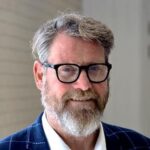It’s Online Educa Berlin this week (you can follow it live on trainingzone here). The first morning of the event was addressed by Howard Rheingold, founder of Rheingold U and author of – among other publications - NetSmart: How to survive online. Rheingold took co-learning as his subject and used the term ‘peeragogy’ to describe a new learning paradigm.
I like the idea of learning from each other. I enjoy entering debates with others – online, face to face and attending conferences where peers with expertise in one area spark an idea which resonates with my own experiences. I learn through these interactions not purely by copying or parroting what someone else has said, but by synthesising new information with my previous experience. The nirvana moment comes when the new information combines with existing knowledge – often forgotten, neglected or overlooked - and something new is created.
But is it really a new paradigm? When collaborating to share knowledge with peers (dictionary definition: someone equal to another in abilities, qualifications, age, background, and social status) that peer-level equality is not constant. What happens in reality is the rapid switching of positions of expertise. While sharing an experience, research, or case study, the person with the story is ‘the expert’ or authoritative voice. While listening, synthesising and reflecting we are the student. The fact that in another moment those roles may be reversed in no way undermines the concept that for that period of time – however brief – someone fulfils the role of More Knowledgeable Other.
The More Knowledgeable Other (or MKO) is a key role within the concept of constructivism and was originally defined by Lev Vygostky almost one hundred years ago. The term is self-explanatory – a more knowledgeable other knows more about something and shares his or her knowledge with the novice. It usually denotes a professional educator – a teacher or trainer. But Vygotsky himself was clear that the MKO could be a peer – even in his studies which focused on young children. A child who already knew how to ride a bike or make a jigsaw could assist his or her peers in mastering the self-same skills.
As well as remotely reviewing the proceedings of Online Educa Berlin, I was also reminded of this in a conversation the other day with senior staff in a teaching hospital. One of the issues they were facing was that junior doctors, having recently graduated, were much slower than their more experienced colleagues. There was a tension within the organisation between being a teaching hospital and meeting time-based targets in relation to emergency care.
Having observed the junior doctors, what was clear was that they were turning to each other for support and assistance in the midst of a busy and demanding shift. In many cases, the More Knowledgeable Other was absent. At best what was happening was the myopic leading the short-sighted. The recently graduated junior doctors were yet to gain through experience the practical skills to address the growing patient backlogs. In circumstances where they had tackled a challenge now faced by a colleague, they didn’t necessarily have the confidence to offer their experience. Certainly, the advice shared was far from a definitive or considered response – especially in the hurry and haste of A&E. Without an extra level of expertise and experience available, they were expected to sink or swim on their own. Unsupported, they were slowly but inexorably sinking.
When Rheingold suggests that he changes a learning paradigm by greeting his students as ‘esteemed co-learners’ I think he is simply adopting the terminology of the collaborative age. He is the TED talker, the visiting professor and the person behind the eponymous Rheingold U on which most of his co-learners have enrolled. It is unlikely that they wholly accept his co-learner credentials. But behind Rheingold’s professed humility is a universal truth. We are all created equal and we are all learners. But effective learning from one another requires someone – for however brief or prolonged a period - to be more expert than others.
Robin Hoyle is a writer, trainer and senior consultant/MD of Learnworks Ltd. He is the author of Complete Training: from recruiment to retirement published by Kogan Page.










